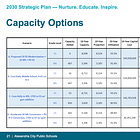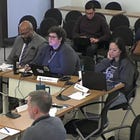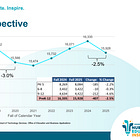Save JH group calls school conversion plan 'fiscally irresponsible'
Save JH calls proposal 'fiscally irresponsible,' cites sufficient capacity after 2031 and recent taxpayer investment in K-8 schools
A community advocacy group that has opposed eliminating elementary education at Jefferson-Houston School is pushing back against school board members’ efforts to accelerate conversions of the city’s two K-8 schools, calling the proposal fiscally irresponsible and premature.
The debate comes as both middle schools operate significantly above capacity, with Francis C. Hammond at 113% utilization and George Washington at 126% utilization, well above the district’s target range of 90-110%. District projections show middle school enrollment peaking at 3,515 students in fiscal 2031 before declining to 3,105 by fiscal 2036.
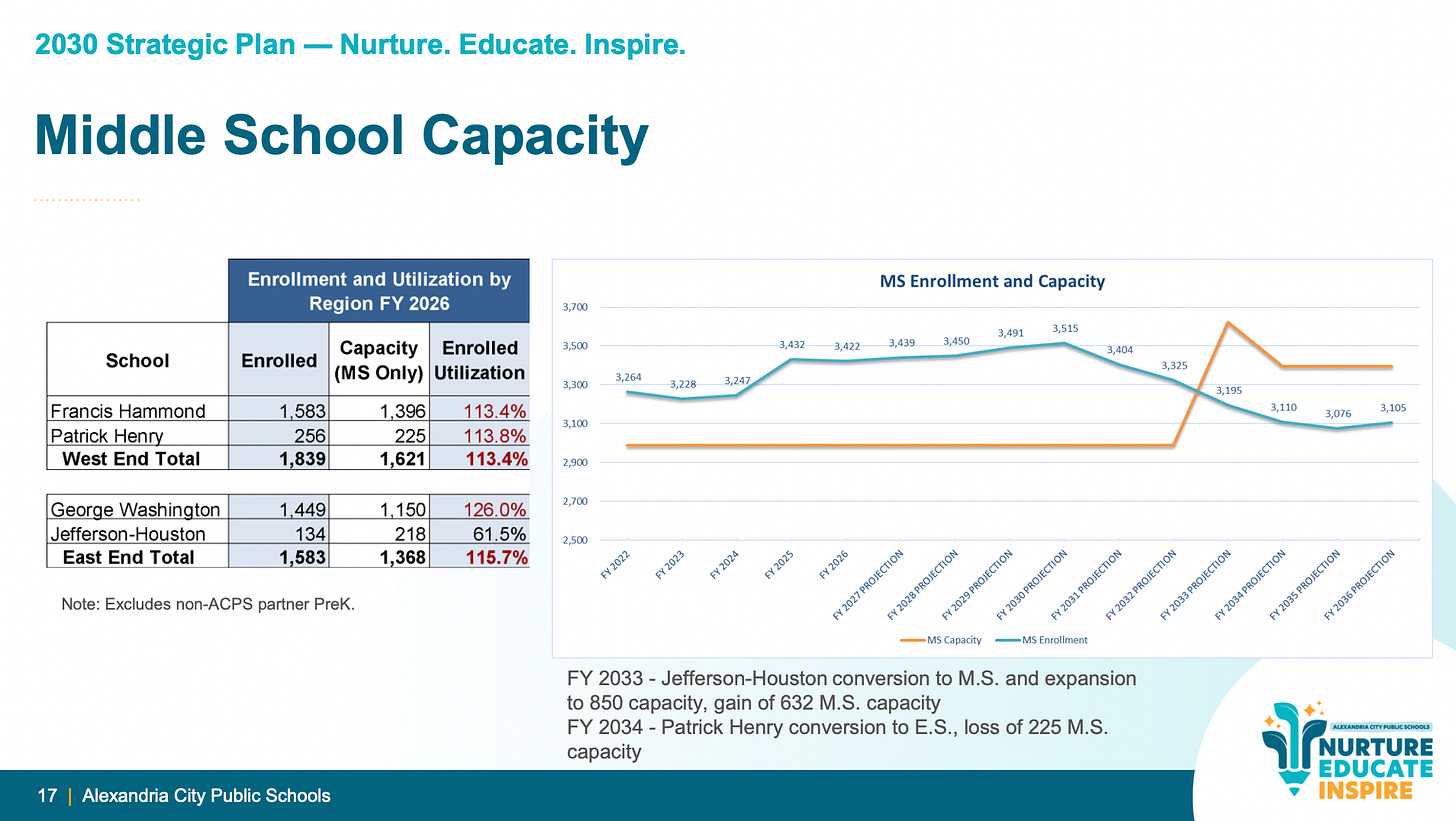
Save Jefferson-Houston released a statement Wednesday criticizing Board Chair Michelle Rief and board member Alexander Crider Scioscia for attempting to fast-track the conversions during Tuesday’s capital budget work session, despite City Council’s rejection of similar proposals earlier this year.
The group, which argues the conversion would disproportionately impact the city’s only majority-Black elementary school, said it was encouraged by other board members who emphasized the need for partnership with city leadership.
“We were deeply disappointed to see Board Chair Rief and Member Scioscia disregard the city’s clear direction during the School Board’s 2026 CIP work session and attempt to accelerate the conversions of Jefferson-Houston and Patrick Henry,” the group said in its statement.
The group argues that spending $40 million to convert schools into middle schools would address capacity needs for what they characterize as only three years, since district projections show sufficient middle school capacity after 2031 once current enrollment peaks subside.
“Spending $40 million to convert schools into middle schools for only three years — when ACPS will not need a third middle school in the out-years — is fiscally irresponsible,” the statement said. “These dollars should be directed toward aging facilities, academic supports, and closing learning gaps, not dismantling already modernized schools.”
The conversions are included in Superintendent Melanie Kay-Wyatt’s proposed $340.4 million capital plan, with design scheduled for fiscal 2030-2031 and construction in fiscal 2031-2032 at a combined cost of approximately $40 million.
During Tuesday’s work session, Scioscia proposed an alternative that would accelerate the timeline for the Jefferson-Houston and Patrick Henry conversions while postponing the $105 million Cora Kelly Elementary modernization. That alternative scenario would cost $46.9 million and stay within city budget guidance, freeing approximately $98 million for other needs including the transportation facility.
“The city has made it very clear that for the next 10 years, they simply will not have the debt capacity to build us any new school,” Scioscia said during the work session, arguing for accelerating the conversions as a more fiscally realistic approach.
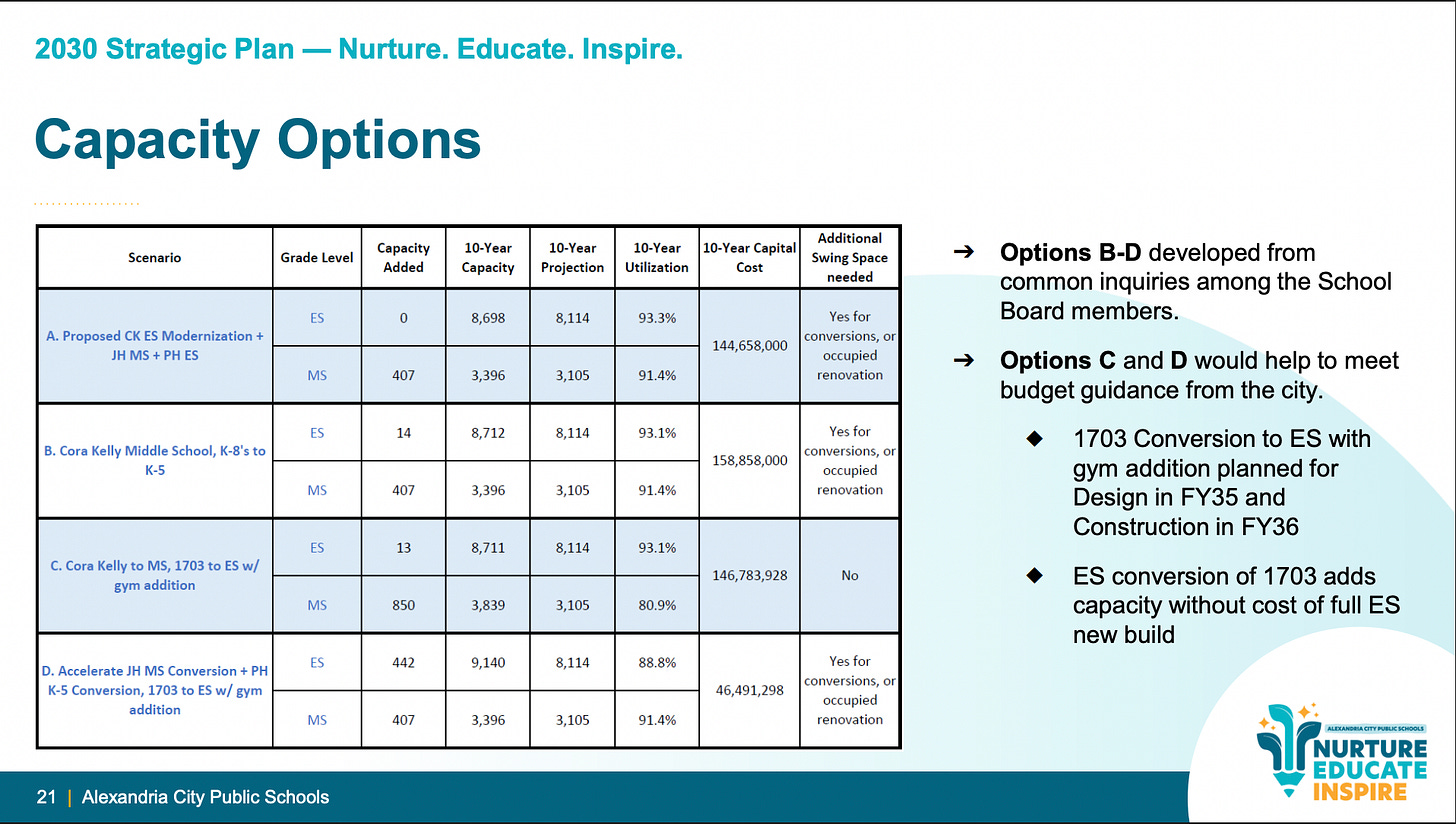
The Save JH group praised board members Ryan Reyna, Abdulahi Abdalla, Donna Kenley, Christopher Harris, Kelly Carmichael Booz and Ashley Simpson Baird for raising concerns and emphasizing that major facilities decisions must be made in partnership with City Council and the mayor.
During Tuesday’s work session, Reyna cautioned that adding modular classrooms to address short-term overcrowding would require eliminating all building maintenance and HVAC projects for an entire year. Harris questioned whether funding earmarked for Cora Kelly would actually materialize given the uncertain fiscal climate. Booz expressed concern about relying on enrollment projections that show declining accuracy beyond five years.
Background on K-8 investments
The group emphasized that Alexandria taxpayers funded major capital projects less than a decade ago specifically to create and support K-8 models at both Jefferson-Houston and Patrick Henry.
“ACPS owes it to the community to fully invest in making these programs succeed before reversing course,” the statement said. “It is neither fiscally responsible nor fair to request large capital commitments and then abandon them without giving the promised model a real chance to work.”
The school board voted in December 2024 to eliminate the K-8 model district-wide, deciding to convert Jefferson-Houston into an 850-student middle school and Patrick Henry into a K-5 elementary school. City Council subsequently removed funding for those conversions from the approved capital budget.
The Save JH coalition has advocated against the conversions since December 2024 and praised City Manager Jim Parajon, Mayor Alyia Gaskins and City Council for rejecting the school board’s proposal earlier this year.
Board member Ashley Simpson Baird defended the K-8 elimination decision during Tuesday’s work session, citing staffing challenges and higher operating costs. She explained that implementing a true K-8 educational program requires teachers with licensure spanning both elementary and middle school levels, which are difficult to find.
“The real educational program in K to 8 is a continuous program from kindergarten through eighth grade,” Simpson Baird said. “But that is very difficult [to] staff, because to do that appropriately, you need staff who have licensure that sort of cuts across both elementary and middle school, which is very difficult to find.”
Save Jefferson-Houston formed in response to the December 2024 decision, which the group argues disproportionately impacts the city’s only majority-Black elementary school serving the historic Parker-Gray community. Jefferson-Houston currently operates at 76% capacity with 478 students in a building designed for 734.
In response to questions from The Alexandria Brief, the coalition says that it includes more than two dozen parents, community members, and former school board members who have organized against the conversion since December 2024. The group maintains a website and Facebook page tracking their advocacy efforts.
According to the coalition, Dave Robbins and Salomea Fredericks, both Jefferson-Houston parents, help organize the coalition and spoke against the conversions at the Nov. 13 public hearing on the capital budget. Both cited enrollment projections showing middle school capacity needs declining after 2030 and questioned the fiscal wisdom of the investment.
Projected growth in Jefferson-Houston zone
The group also highlighted expected student growth in the Jefferson-Houston attendance zone due to the city’s affordable housing pipeline. Major developments in the area are projected to generate significant enrollment increases, though specific projections vary.
“Eliminating JH’s elementary program would destabilize a diverse, thriving neighborhood that relies on a walkable school with Title I services,” the statement said.
Examining the enrollment projections
District enrollment projections show a more complex picture than Save JH’s “three years” characterization suggests.
Middle schools are projected to exceed the district’s target utilization range of 90-110% for six years (fiscal 2027-2032), not three, with overcrowding peaking at 118% in fiscal 2031. The Jefferson-Houston conversion would open in fiscal 2033, adding 632 middle school seats and bringing total capacity to 3,621 seats.
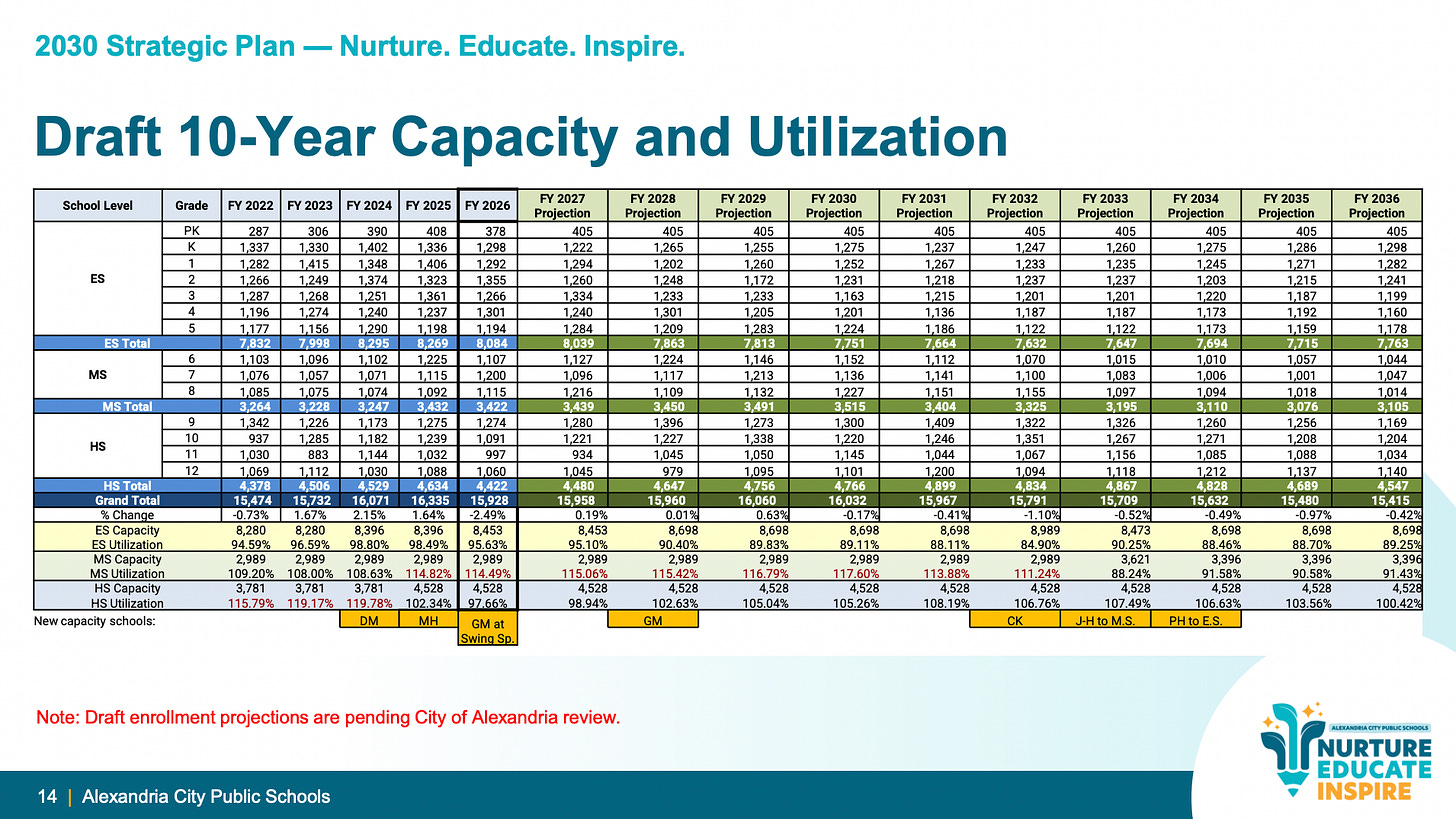
After the conversion, middle school utilization would remain at 88-91% through fiscal 2036 based on current projections. Without the conversion, the district would have 2,989 middle school seats against projected enrollment of approximately 3,100 students in those later years — a 104% utilization rate that exceeds the district’s ideal range.
However, the group’s broader point about fiscal priorities resonates with concerns raised during Tuesday’s work session about whether permanent capacity investments make sense given enrollment volatility. The district’s enrollment projections missed by 617 students this year, compared to just 11 students last year, raising questions about long-term forecasting accuracy.
The Save JH argument aligns with concerns raised by board member Abdalla during Tuesday’s work session, who questioned whether middle school capacity investments would be ready in time to address the enrollment peak before numbers decline again.
“It won’t even be ready until our projection for middle school starts to taper out in the later years,” Abdalla said. “So the use for the new middle school kind of starts to go away as we get into the later years.”
Board Chair Rief acknowledged the tension between enrollment uncertainty and city budget constraints, saying during the works session that her biggest takeaway from meetings with the mayor is to “stay within the guidance.”
School board response
Alexandria City Public Schools did not respond to a request for comment by the publication deadline.
On Friday, November 21, Alexandria City Public Schools provided the following statement, attributed to School Board Chair Dr. Michelle Rief.
The Alexandria City School Board will continue to discuss the Alexandria City Public Schools Capital Improvement Program (CIP) budget and how best to meet the division’s capital needs for the next 10 years at its upcoming work sessions. The Board encourages the Alexandria City community to follow the process leading up to the adoption of the CIP on December 18, 2025 by visiting the CIP budget webpage.
What’s next
The school board will continue capital budget discussions during add-delete sessions on Dec. 11 and Dec. 16, with final adoption scheduled for Dec. 18. The board will hold a joint work session with City Council on Nov. 24 to discuss capital improvement priorities.
The district plans to present a detailed demographic analysis of this year’s unexpected 617-student enrollment decline at the Dec. 4 school board meeting, which could provide additional context for capacity planning decisions.
“We look forward to working with School Board members committed to collaboration with the City leadership, and we urge them to champion solutions that support all Alexandria students and communities,” the Save JH statement concluded.
Full Statement from Save JH
The Save JH community continues to commend the Alexandria City Manager’s Office, the Mayor, and the City Council for their leadership earlier this year in rejecting the School Board’s proposal to eliminate elementary education at Jefferson-Houston, Alexandria’s majority-Black, Title I elementary school serving the Historic Parker-Gray community.
Last night, we were deeply disappointed to see Board Chair Rief and Member Scioscia disregard the city’s clear direction during the School Board’s 2026 CIP work session and attempt to accelerate the conversions of Jefferson-Houston and Patrick Henry.
We are encouraged, however, by Members Reyna, Abdallah, Kenley, Harris, Booz, and Baird, who raised important concerns and reaffirmed that major long-term facilities decisions must be made in deep partnership with the City Council, the Mayor, and the City Manager — with appropriate vetting, analysis, and focus on student impact and outcomes.
We urge the Board to remember that ACPS—and this very body—asked Alexandria taxpayers to fund the major capital projects that created the K–8 models at Jefferson-Houston and Patrick Henry. These were not incidental renovations; the community was promised modern facilities and strong, continuous K–8 programming.
The City and its residents paid for that vision less than a decade ago. ACPS owes it to the community to fully invest in making these programs succeed before reversing course. It is neither fiscally responsible nor fair to request large capital commitments and then abandon them without giving the promised model a real chance to work.
Especially since ACPS’ own data shows that the district will have sufficient middle school and elementary capacity after 2031. Spending $40 million to convert schools into middle schools for only three years — when ACPS will not need a third middle school in the out-years — is fiscally irresponsible. These dollars should be directed toward aging facilities, academic supports, and closing learning gaps, not dismantling already modernized schools.
Additionally, the Jefferson-Houston zone is expected to see significant student growth due to the city’s successful affordable housing pipeline. Eliminating JH’s elementary program would destabilize a diverse, thriving neighborhood that relies on a walkable school with Title I services.
The Save JH team continues to strongly oppose eliminating Jefferson-Houston’s elementary grades — a vital anchor for Parker-Gray and Old Town families. We look forward to working with School Board members committed to collaboration with the City leadership, and we urge them to champion solutions that support all Alexandria students and communities.


